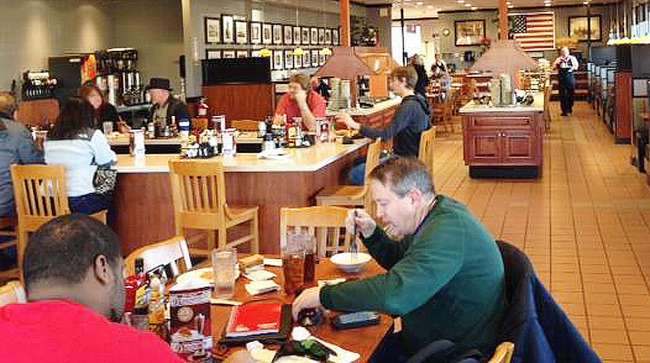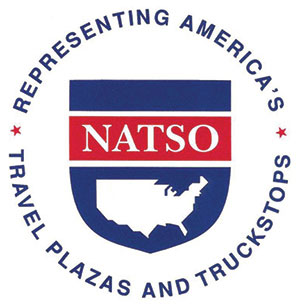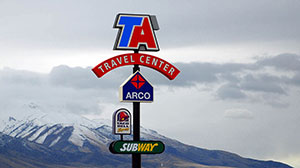Truck Stops Respond to Drivers' Needs

A truck stop is not just a location for drivers to refuel. Across the United States they create a unique “home away from home” for drivers.
Known generally as places that offer services for drivers to refuel their vehicles and buy materials for upkeep, the more remarkable truck stops make an effort to help customers do their best work possible. Some locations are a one-stop shop.

Darren Schulte, vice president of membership at the National Association of Truck Stop Operators, said truck drivers have many specific needs and truck stops need to be aware of them.
“The whole process of literally moving America has to be built on ‘going, going, going, going,’ ” Schulte said. “We can’t say we’re gonna take care of the customer and we’re gonna be fast and do all of these things and not do that. We won’t survive. If we don’t service those trucks quickly to our parking lots, to our stores, to our shops, they won’t come back.”
Truck stops across the country have said their most popular services are options for food such as a sit-down restaurant or a convenience area with healthy options.
The Jubitz truck stop in Portland, Ore., and TravelCenters of America trucks stops in Valley Grove, W.Va., and Vero Beach, Fla., all offer a range of food options from fast food to sit-down dining.
The Iowa 80 truck stop also offers these options and recently opened a convenience store.
“It’s about choices, and it’s about giving people that choice,” said Heather DeBaillie, marketing manager for Iowa 80 truck stop. Located in eastern Iowa, it is likened to a small city replete with a barber shop, dental office, library, movie theater and more.
“We’re trying to make it less stressful when they come here,” she said. “We’re trying to make sure ‘OK, they’re here, we know their time is valuable, what all can they get done in one stop?’ ”
We're on @Nextdoor! Recommend Portlander Inn and help us spread the word! https://t.co/wVJ6nsMgLx — Jubitz (@JubitzTravel) July 2, 2018
Additionally, facilities include showers (enough of them to meet demand and prevent a long line), basketball courts and a place to wash the truck and pets along for the ride.
“We know that our core business is the professional truck driver, and we want to provide a facility that enables them to do whatever they’re visiting for; whether it’s a short break, an overnight stay, a meal, a shower, we want their experience to be the best it could possibly be,” said Tom Liutkus, spokesman for TravelCenters of America.
Natso’s Schulte said there are a lot of small things, that are really huge investments, to be considered when building a travel center. “Nobody just buys a plot of land and drops a truck stop on it.”
One of the responsibilities of Natso is to educate truck stops on how to be better operators, said Schulte. He will have a meal with truck drivers and an owner-operator of a truck stop every week to receive feedback about truck stops and observe truckers. He will then share the information with Natso members.
“Our drivers love to talk,” he said. “They’re very, very intelligent people. They know the industry. They know the roads, and they have a lot of things to say. Breaking bread is a great way to get people to talk openly.”
TravelCenters of America, Jubitz and the Iowa 80 truck stops also rely on customers to improve facilities.
Jubitz has developed a World Class Customer Experience committee (known as WCCE Champions) to share feedback about its services.
“All of these services kind of came about by being part of the day-to-day and observing and seeing everything that a driver could get used to,” said Sonal Patel, marketing manager at Jubitz.
If employees at Iowa 80 have an idea or want to offer feedback, they can tell general management, who will talk to the owner.
“It’s everybody’s job to serve the driver,” DeBaillee said. “It’s everybody’s job to listen. It’s everybody’s job to try to make their life better.”

(Hillary Hartley/Flickr)
TravelCenters of America receives feedback by arranging meetings between executives and a small group of truckers.
“As we listen to drivers and we understand what’s changing in their world, we’ve tried to change with them,” Liutus said.
Its employees are trained to know the needs of the truckers, learning concerns such as hours-of-service and situations when truckers may be in a rush.
“We need to be empathetic, we need to be understanding that they’re on the clock,” Liutkus said. “All of those things are very important in how we care for them.”
Independent truck stops can also adapt to the needs of the truck drivers in their region. For instance, if truck stops are in a region with many female drivers, they adapt the facility to better serve them, according to Schulte.
“They are able to speak to the specific consumer, the specific truck driver that’s stopping at their location,” Schulte said.
Plus, as more and more drivers travel with their pets, truck stops have offered grooming services and pet areas.


